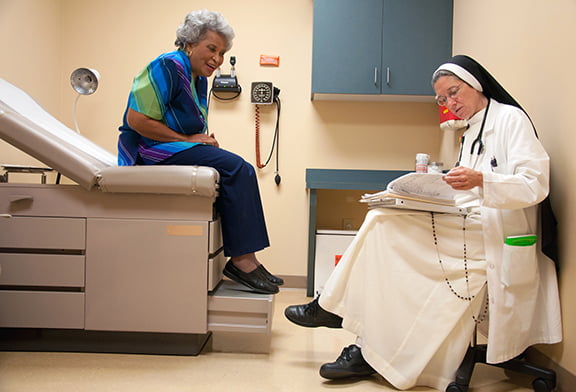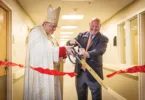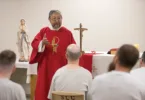
CNS PHOTO/THERESA LAURENCE, TENNESSEE REGISTER Dominican Sister Mary Diana Dreger, a physician, sees a patient at St. Thomas Family Health Center South in Nashville, Tenn., in this file photo. The Health and Human Services contraceptive mandate requires all employers, including most Catholic employers, to provide employees with free health insurance coverage of contraceptives, including some abortion-inducing drugs, and sterilization even if the employer is morally opposed to doing so. Although the Obama administration has announced an accommodation for religious institutions such as hospitals, the Catholic Health Association rejected the administration’s accommodation for religious employers. The CHA said the suggestion to have insurers pick up the costs would be “unduly cumbersome” and “unlikely to adequately meet the religious liberty concerns.”
By Joe Bollig
joe@theleaven.org
KANSAS CITY, Kan. — A growing list of injunctions granted and the certainty of continuing court challenges greet the first anniversary of President Barack Obama’s announcement of the contraceptive mandate.
Currently, there are 43 lawsuits challenging the mandate, with 110 plaintiffs represented in those lawsuits. Some of the lawsuits are by nonprofit religious institutions, and some are by for-profit businesses.
The mandate, which was announced on Jan. 20, 2012, was written by the U. S. Department of Health and Human Services as part of the Affordable Care Act of 2010.
The mandate requires nearly all private insurance plans to include coverage of a variety of preventive services for women — including all Federal Drug Administration-approved contraceptive drugs and devices, surgical sterilizations and abortion-inducing drugs.
All health plans, except those that are “grandfathered” or fall under a very narrow exemption for religious employers, must cover these preventive services without co-pays or cost sharing.
The mandate is “one of the greatest attacks on religious liberty that we have seen in a lifetime,” said Emily Hardman, communications director and an attorney with the Becket Fund, a nonprofit religious liberty law firm based in Washington, D.C.
In a response to a storm of protest, on Feb. 10, 2012, President Obama announced an accommodation for religious institutions (such as colleges and hospitals) that were not grandfathered or did not meet the narrow religious exemptions.
The accommodation was that the religious institution’s insurance companies would pay for the objectionable services. Also, religious employers who were not grandfathered and did not meet the exemption criteria were granted a one-year “safe harbor,” delaying enforcement of the mandate. The Obama administration also made statements about the possibility of future, possible accommodations.
“The harbor is neither safe nor is it a harbor, because [the entities] are still subject to the mandate through private lawsuits,” said Hardman. “They still have to make budgeting decisions way in advance to comply, and so there are a number of things impacting them now.”
Thanks to the so-called “safe harbor,” a number of lawsuits have been dismissed, because the courts said the cases were not “ripe” since the Obama administration promised to consider future, possible accommodations. This is what happened to the challenge by the Diocese of Peoria and the University of Notre Dame.
There was, however, a significant victory achieved with lawsuits filed by Belmont Abbey College in Charlotte, N.C., and Wheaton College in Illinois.
“[These lawsuits] were dismissed at the trial court level for that very reason,” said Hardman. “The courts said, ‘You’ve been promised an accommodation, hold off and come back later if they don’t actually accommodate you.’”
“The District of Columbia Court of Appeals reinstated our cases and . . . held the administration’s feet to the fire,” she continued. “[The court] said, ‘You must give us a status report every 60 days on the new rule; you must issue something by March; and the final rule must be in place by August.’”
Another significant victory was when the U. S. District Court allowed the Archdiocese of New York to proceed with its lawsuit despite the “safe harbor” and the Obama administration’s promise to consider future accommodations.
“The First Amendment does not require citizens to accept assurances from the government that, if the government later determines it has made a misstep, it will take ameliorative action. There is no ‘Trust us, changes are coming’ clause in the Constitution,” wrote Judge Brian Cogan.
There are no “safe harbors” for private, for-profit firms, and many Catholic businesspersons who object to the mandate face the prospect of violating their religious beliefs or incurring huge fines.
Although the mandate took effect in August 2012, new insurance plan years for many of these firms began this Jan. 1. That is why several lawsuits were filed before that date.
According to the Becket Fund, there have been 12 rulings regarding lawsuits by for-profit firms against the mandate. Nine firms had their injunctions granted, and three were denied. One of those firms whose lawsuit was denied at the circuit court level was Hobby Lobby, which is now subject to penalties of $1.3 million per day.
Hobby Lobby will appeal the ruling, and its future prospects are good. That’s because of a ruling by a different circuit court in a similar case, which found that the mandate violates the business owner’s religious liberty.
“We’re building toward a vindication of our First Amendment rights in court and the consciences of all Americans would be protected,” said Hardman.
In a letter to Catholic business owners on Dec. 18, 2012, Archbishop Joseph F. Naumann outlined some options they could take.
One option is that Catholic employers could discontinue health care coverage, but this would present moral and practical problems, and still leave them subject to fines beginning in 2014. Another option is temporary compliance joined with legal opposition.
“I would propose that you consider the possibility of filing a lawsuit against the HHS mandate, asking to be relieved of the requirements of the mandate on the basis that it violates your conscience rights and the free exercise of your religious beliefs,” wrote the archbishop.
The archbishop also recommended that if businesspersons go this route, that they seek assistance from the Becket Fund and the Alliance Defending Freedom.
“The government’s actions have created a real moral dilemma for conscientious Catholic and non-Catholic employers alike,” the archbishop wrote. “All Americans should be concerned about these mandates and should work so that our nation’s heritage of religious liberty is protected.”






